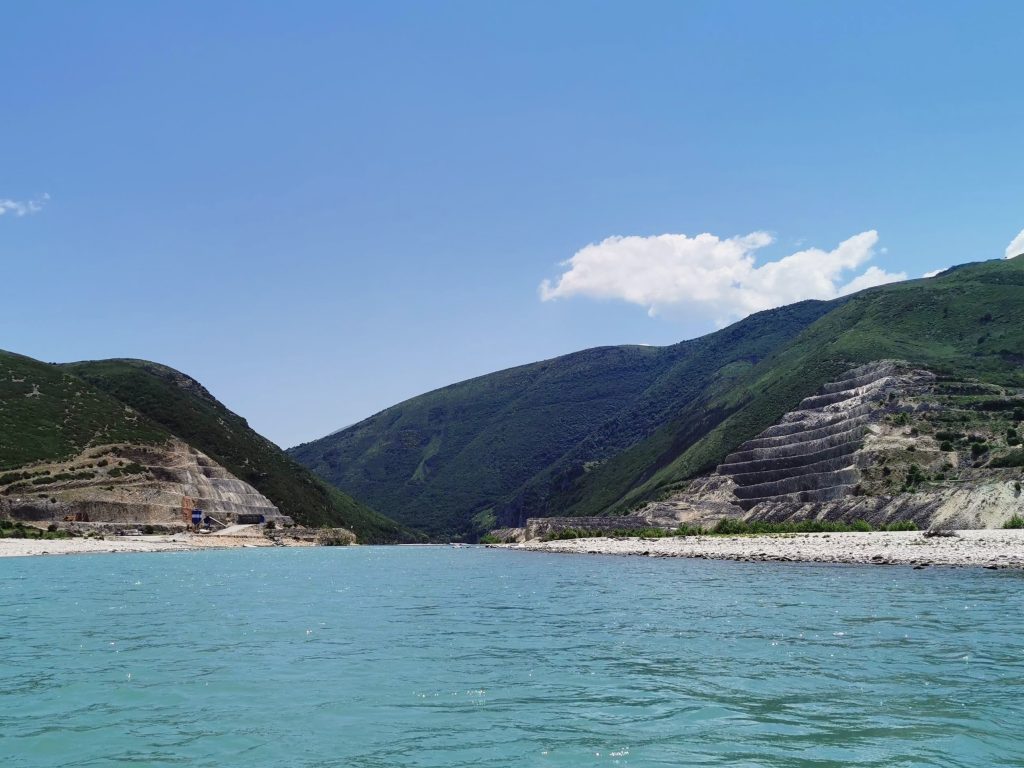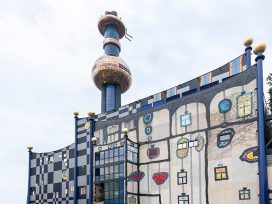The success of recent protests against extractivism and ecosystem degradation in Serbia and Albania highlights the potential for democratic reinvigoration around ecological issues in south east Europe. But the EU has yet to prove it can act as a credible partner in this process.
In the past decade, the Balkans have witnessed a surge in environmental protests, fuelled by concerns over the region’s ecological heritage and the impact of human activity on natural resources. The Vjosa River protests in Albania – opposing the construction of hydropower plants on one of Europe’s last wild rivers – and the Jadar movement in Serbia – fighting against the exploitation of one of the continent’s largest lithium reserves – are prominent examples.
The two movements diverged in terms of their organisation, duration, and tactics. The Jadar protests lasted a few months and involved political actors, while the Vjosa ones spanned several years and were driven by grassroots initiatives and non-profit organizations. Despite their differences, both movements successfully mobilised citizens and influenced political outcomes. In January 2022, the Serbian prime minister announced the withdrawal of Rio Tinto’s exploration permits for the Jadar project. Similarly, in March 2023, the Vjosa River was declared a national park, shielding it from any additional developments.

Construction site at the proposed hydroelectric plant at Kalivaç, Albania, on the Vjosa River. June 2019. Source: Wikimedia Commons
Biodiversity under attack
Originating in Greece, the Vjosa is one of the last wild rivers in Europe, flowing for over 270 kilometres without any artificial obstacles. Its basin is home to over 1100 species of animals and plants, some of which are internationally classified as threatened.
In May 2017, the Albanian government re-launched a tender for the construction of a large hydropower plant in Kalivaç, which had been initiated in 2007 with the Italian Becchetti group but shelved. The termination of the agreement with Becchetti was prompted in 2016 by serious allegations of document forgery and money laundering related to the project. This time around, the government offered the concession to Turkish investors. Another project in Poçem included the construction of a 25-metre dam wall, endangering the river’s gravel islands and alluvial forests. Protests grew in intensity in 2018, when construction was about to resume in Kalivaç. The main investor was Ayen-Alb, a joint venture of Albania’s Fusha and Turkey’s Ayen Enerji.
In Serbia, the Jadar River Valley is home to a diverse range of plant and animal species. Besides its biodiversity, the river provides a key water source for surrounding communities. The valley also holds one of the world’s largest lithium deposits, a strategic resource for electric vehicle batteries. Jadar was set to become Europe’s biggest lithium mine, helping the EU meet its fast-growing demand in advance of the phasing out of carbon-emitting combustion engines in 2035.
The discovery of lithium deposits in Jadar dates back to 2004. The Anglo-Australian mining corporation Rio Tinto planned to start constructing mining facilities in 2023, aiming for the first saleable product to enter the market by 2026. Rio Tinto had not produced an environmental impact study for the Serbian authorities. The imminent commencement of Rio Tinto’s operations at the Jadar mine led to major protests between September 2021 and February 2022.
Lessons learned
While both protests were centred around the preservation of natural sites, the two movements had different structures, tactics, and scale.
The backlash against the Kalivaç hydropower plant involved grassroots movements led by local activists, environmental organisations and concerned citizens across Albania. Several influential nonprofits such as EcoAlbania, Riverwatch, EuroNatur and Front 21/42 played a pivotal role, whether in mobilising public protest, engaging policymakers or collaborating with scientists.
The environmental nonprofits spearheaded the Vjosa River protests through the Save the Blue Heart of Europe, an international coalition to protect the rivers in Balkan countries against dam projects and to promote higher standards for preservation. Formed in 2012, the coalition was also involved in protecting other rivers in the Balkans, including the Sava and the Neretva.
The movement took action through small but persistent initiatives, exerting continuous pressure on the Albanian government. Fear of repression and violence is one explanation for the choice of non-confrontational advocacy efforts over mass public demonstrations. In 2011, anti-government protests involving tens of thousands of citizens had led to violent clashes between demonstrators and the police, leaving four people dead and dozens more injured.
With their advocacy-driven approach, civil society organisations also hoped to engage Albania’s prime minister Edi Rama, who had been a leader of the 2011 protests. A member of the Socialist Party, Rama had gained popularity and support during his tenure as the mayor of Tirana by implementing initiatives that improved the city’s infrastructure and quality of life for its residents. Ahead of the 2013 parliamentary election, Rama had promised to combat corruption, revitalise the economy, and pursue European integration. His background and popularity made him a possible interlocutor for civil society organisations.
The advocacy approach proved effective for the Vjosa river protest movement, but the limited popular involvement raises concerns about the extent of societal buy-in. In-person demonstrations and a higher degree of public involvement, as was the case in Serbia with the Jadar protests, could also have placed more pressure on the government to address the issue earlier.
The reason behind mass participation in the Jadar protests is partly the involvement of political actors. In September 2021, the Ecological Uprising movement organised a protest demanding that Rio Tinto halt the mining project and leave the country. Endorsed by the Democratic Party and the People’s Party, the demonstrations attracted thousands of participants.
During the protests, the lines between politics and civil society became blurred. In mid-2021 Aleksandar Jovanović Ćuta, a prominent Ecological Uprising activist, declared that the movement would field candidates for the 2022 Belgrade city assembly election. In November 2021, amidst the ongoing Jadar protests, he announced that the movement would also take part in the Serbian parliamentary elections in 2022.
The prominence of in-person demonstrations in Serbia was also the result of President Aleksandar Vučić’s clampdown on civil society. In 2020, Serbia passed anti-terror legislation imposing strict reporting requirements and financial penalties on organisations receiving funds from abroad. While keeping up democratic appearances, Vučić exerts near-complete control over the country’s media and centres of power.
Between 2018 and 2020, sustained and largely peaceful demonstrations had taken place against Vučić’s increasingly authoritarian rule. With most avenues of dissent blocked, public protests became one of the last remaining outlets for expressing opposition.
Though effective in mobilising mass participation, the involvement of political parties linked to the opposition risked forfeiting the protests’ credibility. Moreover, if the new political actors that emerged during the Jadar protests fail to hold true to their environmental commitments, further disenchantment among Serbians will be the result.
Mavrovo and Bor
Both the Vjosa and the Jadar movements drew on the experience gained from previous protests. Between 2014 and 2015, close to the timing of the Vjosa protests, Save the Blue Heart of Europe was active in the protection of North Macedonia’s Mavrovo National Park, home to beech forests and the critically endangered Balkan lynx.
The park was threatened by the construction of two hydropower plants funded by the World Bank and the European Bank for Reconstruction and Development (EBRD). One of the environmental coalition’s main requests was the withdrawal of World Bank and EBRD funding. It accomplished this through several tactics, including a petition submitted to the prime minister that gathered over 100,000 signatures. At the end of 2015, the World Bank announced its decision to withdraw from the project. EBRD followed in 2017.
The Jadar protests also had a successful predecessor. In 2018, the Serbian energy minister announced that China’s Zijin Mining Group had won a tender to become a strategic partner in one of Europe’s largest and Serbia’s only copper complex, RTB Bor. Located in eastern Serbia, the mine had been operating since the early 1900s and faced a number of environmental and social issues, including water and air pollution, and health impacts on local communities.
After the Chinese takeover and expansion of the Bor mine, air pollution worsened, with sulphur dioxide levels topping 2000 micrograms per cubic metre, up from the maximum allowed of 350. Between the end of 2019 and the beginning of 2020, the citizens of Bor organised several protests that eventually compelled the city’s mayor to file an official criminal complaint against Zijin, and led the government to take steps aimed at holding the company accountable. In early 2021, Serbia ordered Zijin to complete a wastewater treatment plant after failing to adhere to environmental standards.
Kayaks and roadblocks
The advocacy tactics used against the proposed hydropower plants on the Vjosa River not only helped the coalition to raise national and international awareness, but also kept the issue present in the public consciousness for years. This ultimately put significant pressure on the government to reconsider its plans for the river.
The international dimension of the movement served as evidence that environmental protection is a global concern that can attract support beyond the local groups and communities that are directly affected.
Another noteworthy example of an internationally oriented initiative was the Balkan River Tour in 2016. Kayakers from various countries, including Italy, Germany and the Netherlands, embarked on a journey down threatened rivers in the Balkans to draw attention to the detrimental consequences of dam construction. The tour culminated in a powerful protest held in front of the Albanian prime minister’s office in Tirana, where kayaks were displayed adorned with hundreds of signatures opposing the proposed dams on the Vjosa and advocating for the establishment of a national park.
Two years later, Save the Blue Heart of Europe organised a concert for Balkan rivers as the culminating event of the first European Rivers Summit in Sarajevo. The gathering attracted over 200 activists, scientists, and concerned citizens from various countries, who shared the common objective of preserving and restoring clean, free-flowing rivers in the region.
Capitalising on mass participation, the Jadar protests were mostly national. Strategic road blockades across Serbia proved particularly effective in capturing attention. By causing inconvenience to people and disrupting economic activity, the blockades added to the pressure on decision-makers.
The intensity of the protests escalated in November 2021, following the Serbian government’s proposal to modify two crucial national laws. The proposed changes sought to increase the state’s power to expropriate properties within a mere eight-days, which would expedite the relocation of communities near the planned mine, and to remove the threshold for the number of votes needed for a referendum to pass, replacing it with simple majority. Serbian officials had previously suggested the possibility of a referendum on Rio Tinto’s operations in Jadar.
In 2020, Rio Tinto had initiated the acquisition of land surrounding the lithium reserve, often presenting compensation as the sole alternative to expropriation. The company’s mention of expropriation seemed to anticipate the new law, which the communities around Jadar perceived as a direct threat.
This was the peak of discontent among the Serbian public. On 4 December 2021 one of the largest protests occurred, with demonstrators blocking the Freedom Bridge in Novi Sad and halting traffic on motorways in Niš, Užice, Subotica and other cities. The Serbian government was forced to withdraw the proposed expropriation law, but decided to retain the amendments to the referendum legislation, fueling further unrest.
In collaboration with over 40 initiatives and movements, Ecological Uprising acknowledged the withdrawal of ‘predatory laws’ as a positive step, but emphasised that victory was not yet complete. The movement called for the immediate public disclosure and nullification of all agreements with Rio Tinto. Meanwhile, demonstrators continued to stage blockades on roads, major motorways and bridges in over 50 locations across Serbia.
Democratic impact
The Vjosa and the Jadar protests are among the highest profile and most successful environmental campaigns in the history of Albania and Serbia, reflecting growing awareness and concern about environmental issues among citizens and interested stakeholders.
In different ways, these two movements united diverse individuals, communities, and organisations, providing a platform to voice concerns and express dissent. In doing so, they highlighted the transformative power of an engaged and active citizenry in democratic decision-making.
In Albania, the protests brought the protection of the Vjosa to the forefront of political discussions. In 2020, then-president Ilir Meta officially advocated for the creation of a national park. During the 2021 electoral campaign, the opposition leader of the Democratic Party Lulzim Basha emphasised his commitment to safeguarding the river and preventing the construction of hydropower plants.
In response to the mounting pressure, prime minister Edi Rama also pledged to protect the area and later announced the cancellation of the hydropower project. The following year, he sought re-election with the promise to declare the Vjosa a nature park. Still, the protest campaign persisted until the full protection measures were put in place for the river in early 2023.
The political consequences of the environmental protests were even deeper in Serbia, ushering in the emergence of new political forces. After announcing its participation in the 2022 general election, Ecological Uprising formed the Moramo (We Must) coalition with Together for Serbia and Do not let Belgrade Drown.
Moramo’s impact on Serbian politics has been profound. The coalition garnered approximately 5 per cent of the popular vote in the general election, winning 13 seats in the National Assembly. In June 2022 Together for Serbia, Ecological Uprising and Assembly of Free Serbia merged into Zajedno (Together), a party with a green-leftist political orientation. The party presents environmental protection, energy transition, and direct democracy as its core priorities.
The advent of Moramo and Zajedno invigorated the political landscape in Serbia by strengthening the opposition and offering new perspectives. It provided a platform for progressive voices to advocate for environmental concerns and drive meaningful change through democratic participation. The two parties have showed the possibility for an alternative road, even if they have not yet been able to challenge Vučić’s grip on power.
The success and visibility of the Jadar and Vjosa protest movements have already inspired other communities facing similar environmental and social concerns. Emboldened by their success in Albania, the leaders of Save the Blue Heart of Europe have announced their intention to take their river-first approach to other Balkan countries. Bosnia-Herzegovina and Montenegro, where the battle to preserve pristine waterways from mounting environmental pressures is intensifying, have been chosen as the coalition’s next priority. The creation of the Vjosa National Park could inspire protection efforts for rivers around the world, such as the free-flowing Patuca in Honduras, the second-largest river in Central America.
Double standards at the EU level?
The EU expressed support for both the Vjosa River and Jadar protests, but not with the same level of engagement. A key objective of the EU’s biodiversity strategy for 2030 is to rehabilitate a minimum of 25,000 kilometers of free-flowing rivers. The safeguarding of Europe’s rivers and coastal waters is also at the core of the Water Framework Directive. For these reasons, EU support for the protection of the Vjosa River has been determined and consistent over the years.
In 2018, the European Parliament passed a resolution on Albania expressing concern about economic projects ‘that have resulted in severe environmental damage within protected areas, such as large-scale tourist resorts and hydropower plants along the Vjosa and Valbona rivers’. The resolution also encouraged Albania to reassess its renewable energy strategy and reduce its dependence on hydropower for electricity generation.
Concerns regarding the Vjosa were also included in the 2021 Progress Report on Albania, in which the EU urged the Albanian government to ‘establish as soon as possible the Vjosa National Park, extending the whole length of the river’.
But the EU’s response to the Jadar lithium mine project was much more restrained, given the Union’s substantial need for lithium in its energy transition. With the phase-out of combustion engines by 2035, it is expected that 30 million electric cars will be in use by 2030. EU countries already produce more than a quarter of the world’s electric vehicles, and Germany’s Volkswagen aspires to become the largest electric-car maker by 2024, surpassing Tesla.
In December 2021, while the Jadar protests were ongoing, EU Commission Spokesperson Ana Pisonero stated that the project was ‘a very good opportunity for the socio-economic development of Serbia provided it respects the highest environmental standards’, adding that the EU would help Serbia attract partners and investments to develop sustainable value chains for raw materials and batteries.
These different approaches reflect the EU’s difficulty in reconciling its support for environmental struggles with its economic interests in the context of ecological transition.
The future of environmental protest
The Vjosa River and Jadar protests adopted distinct approaches that reflect the political and social circumstances in their respective countries. But despite their differences, both movements are proof of the democratic impact of citizen engagement on environmental issues in the region. Not only did they successfully halt the projects they were opposing, the protests also fostered government and corporate accountability, and opened new avenues for political change.
But environmental struggles are not over.
In Serbia, Rio Tinto has not given up on its project in Jadar. The company has been purchasing land around the proposed site of the mine, and the possibility of holding a referendum on the mining project is still on the table. The response of Zajedno and other new green and leftist political actors remains to be seen. In Albania, meanwhile, civil society organisations are now mobilising against the construction of an international airport in Vlora, which poses a threat to the migratory bird areas on the Adriatic Sea.
In the coming years, the emergence of environmental movements will likely continue to shape the political landscape in Albania, Serbia, and other Balkan countries. The EU can be a valuable ally in this process. But to maintain its credibility as a genuinely democratic force, it must take a consistent stance and openly address any conflicts of interest.
Published 7 June 2023
Original in English
First published by Eurozine
© Raluca Besliu / Green European Journal / Eurozine
PDF/PRINTIn collaboration with
In focal points
- Living dead democracy
- Why Parliaments?
- Spelling out a law for nature
- No more turning a blind eye
- The end of Tunisia’s spring?
- Protecting nature, empowering people
- Albania: Obstructed democracy
- Romania: Propaganda into votes
- The myth of sudden death
- Hungary: From housing justice to municipal opposition
Newsletter
Subscribe to know what’s worth thinking about.
Related Articles

Europe produces 5 tons of waste per capita each year and exports a significant portion of it for other countries to handle. Can we reduce, reuse, and recycle our way out of this? New talk show episode premiers today.

Nine years ago, a slim majority of UK voters chose to leave the European Union – without a clear plan or the tools to make it happen. Five years after the de facto departure, relations are slowly being repaired, driven in part by the increasingly unpredictable political climate in the United States.






